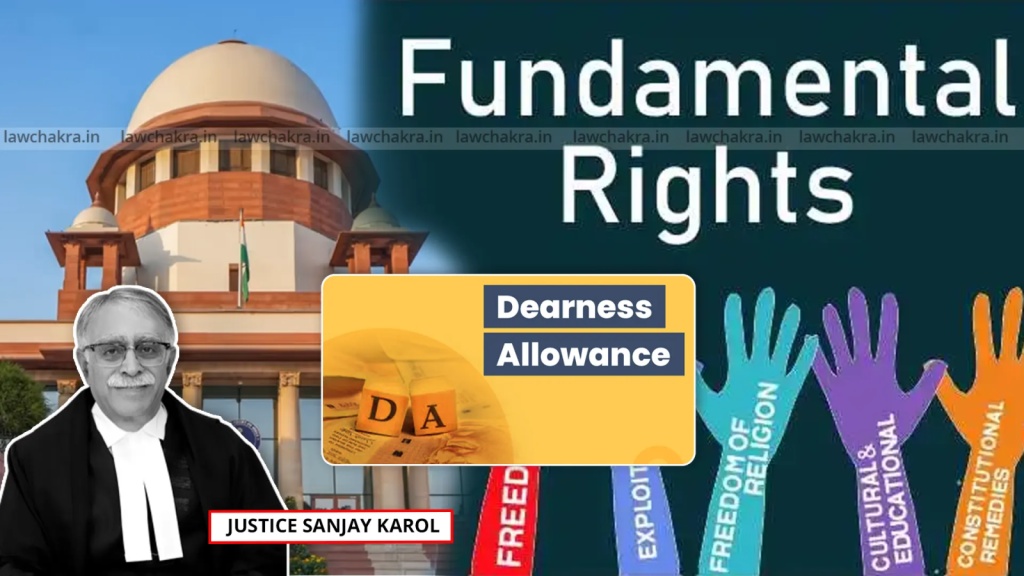
Legal Battle Over Dearness Allowance for West Bengal Government Workers
The Supreme Court of India has initiated a critical legal review to determine whether the Dearness Allowance (DA) provided to West Bengal government employees constitutes a fundamental right. This case, heard on August 5, has significant implications for millions of public sector workers across the state. The court’s scrutiny centers on whether DA, a financial component of salaries, is legally mandated or a discretionary benefit. The state government and employee unions have presented opposing views, with the former asserting that DA is not a constitutional entitlement, while the latter demands parity with central government rates. The proceedings, led by a bench of Justices Sanjay Karol and Prashant Kumar Mishra, are expected to shape future salary structures and employee rights. Legal experts suggest the ruling could redefine the scope of statutory obligations for state governments in providing financial benefits to public servants.
State’s Position: DA as a Flexible Policy Tool
West Bengal’s government has firmly maintained that there is no legal obligation to provide DA as a guaranteed right. During the hearing, officials emphasized that each state in India independently determines DA rates based on fiscal capacity and local economic conditions. Senior advocate Kapil Sibal, representing the state, argued that DA is not a centrally mandated benefit and that states have the autonomy to adjust it as needed. This stance reflects a broader trend where state governments often prioritize budgetary constraints over uniform salary structures. However, critics argue that this approach undermines employee welfare and creates disparities in compensation across regions. The court’s inquiry into past High Court rulings, which referenced DA in the context of fundamental rights, highlights the tension between administrative flexibility and constitutional guarantees.
Unions Push for Equal Treatment with Central Government Rates
Employee unions have challenged the state’s policy, demanding that West Bengal align DA rates with those of the central government. They argue that public servants in the state should receive equal treatment, as the current disparity violates principles of equity and fair compensation. Union representatives highlighted that central government employees receive higher DA, which affects their purchasing power and living standards. This discrepancy has sparked widespread concern among workers, with many fearing that the court’s decision could exacerbate existing inequalities. While the state government acknowledges the need for fair compensation, it contends that financial feasibility and local economic factors must be considered. The court’s focus on balancing legal rights with administrative discretion underscores the complexity of the issue.
Supreme Court Balances Legal Rights and Administrative Discretion
The bench has emphasized the need to strike a balance between protecting employee rights and allowing states flexibility in financial management. Justice Karol’s query about ‘frivolous complaints’ versus ‘dishonest officers’ reflects the court’s intent to prevent misuse of legal processes while ensuring accountability. The case has drawn attention from across the country, as similar disputes exist in other states regarding DA and other salary components. Legal scholars suggest that the ruling could influence how states approach financial benefits for public servants, potentially leading to standardized frameworks or greater autonomy. The court’s decision may also impact the interpretation of fundamental rights in the context of administrative policies, setting a precedent for future cases.
Outcome Could Reshape Salary Structures and Employee Rights
The outcome of this case is expected to have far-reaching implications for salary structures and employee rights in India. If the Supreme Court rules in favor of employees, it could mandate that DA be treated as a statutory entitlement, forcing states to adopt uniform rates. Conversely, a ruling in favor of the state may reinforce the principle of administrative discretion in financial matters. Both sides have acknowledged the need for a balanced approach, with the court’s role being to mediate between legal principles and practical governance. The hearing, which is ongoing, has already sparked debates about the role of the judiciary in shaping public policy. As the case progresses, its resolution may redefine the legal landscape for government employees nationwide, influencing how states manage financial benefits and employee welfare.



